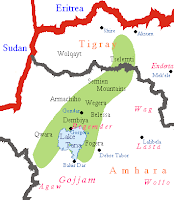When the Israelites reached Canaan, the Danites were given territory in the western coastal plains, but suffered from encounters with the Philistines. They therefore looked for other lands to inhabit. Judges 18 tells that they moved far north and captured and renamed a peaceful city.
There are theories that they were one of the first of the tribes to travel so far that they were "lost." This brings us to the Jews in Ethiopia and Eldad ha-Dani.
Eldad ben Maḥli ha-Dani was active c. 851 – c. 900, traveling all over and writing about his thoughts and theories. Besides being a merchant, he studied the different dialects he found during his wanderings, writing about them in his work, the Sefer Eldad, which has been a valuable resource for scholars of the languages used by Jews.
Outside of writing about language, his accounts are too fanciful to be taken at face value. He writes that he and a companion from the Tribe of Asher sailed on a boat that was wrecked in a storm, but God saved them in a box which then came ashore among Ethiopians who ate his much larger companion. Eldad was put in a pit to be fattened up to be eaten, but another tribe attacked the cannibals and took Eldad prisoner. After four years he was taken to a place called Azanian (theorized to be southern Africa), where he was exchanged for 32 pieces of gold to a Jewish merchant from the Tribe of Issachar.
He claimed knowledge of some of the Lost Tribes. Dan traveled to Kush (in Africa), and was later joined by Asher, Gad, and Naphtali. The four tribes were nomadic and fought constantly with the Ethiopian kings. They have the Scriptures except for the Book of Esther and Lamentations. They know the Talmud, but have none of the commentaries by Talmud scholars.
There is more, but that is enough to know that his account—although widely accepted for a few centuries—was looked at with raised eyebrows by later scholars. One of his claims, however, corresponded with a claim made in another document, and that may have created a medieval legend that would not die.
Eldad wrote that, on the other side of the river of Kush where these Jewish tribes lived, there was the Bnei Moshe, the Tribe of Levi, surrounded by the River Sambastion. Sambastion flows with sand and stones for six days and stops on the Sabbath. Fire surrounds the river, and no one can approach it. The other tribes communicate with the Bnei Moshe by yelling across the distance.
Curiously, this place is described in a different medieval story, and it ties into the legend of a powerful Christian king outside of Europe, a king that the Crusades hoped to contact and ally with during the Crusades. Tomorrow we touch on the subject of Prester John.


